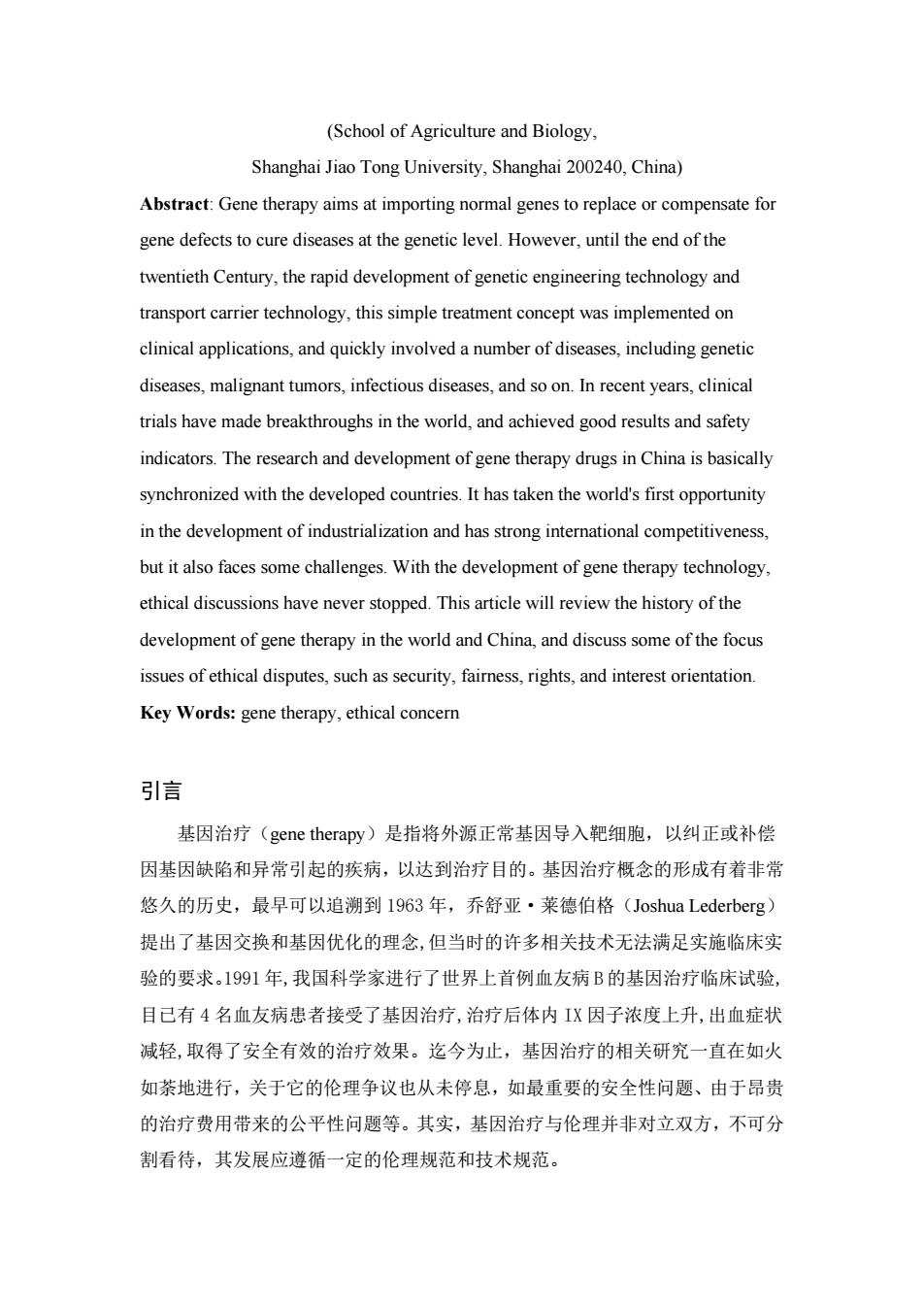正在加载图片...

(School of Agriculture and Biology, Shanghai Jiao Tong University,Shanghai 200240,China) Abstract:Gene therapy aims at importing normal genes to replace or compensate for gene defects to cure diseases at the genetic level.However,until the end of the twentieth Century,the rapid development of genetic engineering technology and transport carrier technology,this simple treatment concept was implemented on clinical applications,and quickly involved a number of diseases,including genetic diseases,malignant tumors,infectious diseases,and so on.In recent years,clinical trials have made breakthroughs in the world,and achieved good results and safety indicators.The research and development of gene therapy drugs in China is basically synchronized with the developed countries.It has taken the world's first opportunity in the development of industrialization and has strong international competitiveness, but it also faces some challenges.With the development of gene therapy technology, ethical discussions have never stopped.This article will review the history of the development of gene therapy in the world and China,and discuss some of the focus issues of ethical disputes,such as security,fairness,rights,and interest orientation. Key Words:gene therapy,ethical concern 引言 基因治疗(gene therapy)是指将外源正常基因导入靶细胞,以纠正或补偿 因基因缺陷和异常引起的疾病,以达到治疗目的。基因治疗概念的形成有着非常 悠久的历史,最早可以追溯到l963年,乔舒亚·莱德伯格(Joshua Lederberg) 提出了基因交换和基因优化的理念,但当时的许多相关技术无法满足实施临床实 验的要求。1991年,我国科学家进行了世界上首例血友病B的基因治疗临床试验, 目已有4名血友病患者接受了基因治疗,治疗后体内IX因子浓度上升,出血症状 减轻,取得了安全有效的治疗效果。迄今为止,基因治疗的相关研究一直在如火 如茶地进行,关于它的伦理争议也从未停息,如最重要的安全性问题、由于昂贵 的治疗费用带来的公平性问题等。其实,基因治疗与伦理并非对立双方,不可分 割看待,其发展应遵循一定的伦理规范和技术规范。(School of Agriculture and Biology, Shanghai Jiao Tong University, Shanghai 200240, China) Abstract: Gene therapy aims at importing normal genes to replace or compensate for gene defects to cure diseases at the genetic level. However, until the end of the twentieth Century, the rapid development of genetic engineering technology and transport carrier technology, this simple treatment concept was implemented on clinical applications, and quickly involved a number of diseases, including genetic diseases, malignant tumors, infectious diseases, and so on. In recent years, clinical trials have made breakthroughs in the world, and achieved good results and safety indicators. The research and development of gene therapy drugs in China is basically synchronized with the developed countries. It has taken the world's first opportunity in the development of industrialization and has strong international competitiveness, but it also faces some challenges. With the development of gene therapy technology, ethical discussions have never stopped. This article will review the history of the development of gene therapy in the world and China, and discuss some of the focus issues of ethical disputes, such as security, fairness, rights, and interest orientation. Key Words: gene therapy, ethical concern 引言 基因治疗(gene therapy)是指将外源正常基因导入靶细胞,以纠正或补偿 因基因缺陷和异常引起的疾病,以达到治疗目的。基因治疗概念的形成有着非常 悠久的历史,最早可以追溯到 1963 年,乔舒亚·莱德伯格(Joshua Lederberg) 提出了基因交换和基因优化的理念,但当时的许多相关技术无法满足实施临床实 验的要求。1991 年,我国科学家进行了世界上首例血友病 B 的基因治疗临床试验, 目已有 4 名血友病患者接受了基因治疗,治疗后体内 IX 因子浓度上升,出血症状 减轻,取得了安全有效的治疗效果。迄今为止,基因治疗的相关研究一直在如火 如荼地进行,关于它的伦理争议也从未停息,如最重要的安全性问题、由于昂贵 的治疗费用带来的公平性问题等。其实,基因治疗与伦理并非对立双方,不可分 割看待,其发展应遵循一定的伦理规范和技术规范